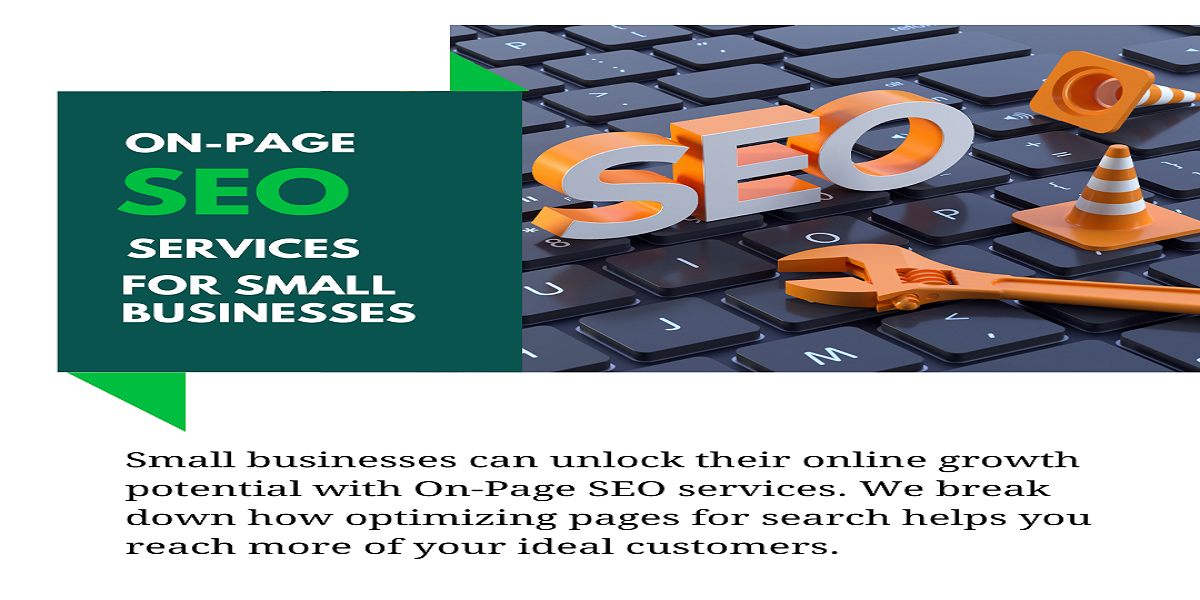
On-Page SEO Services The Game-Changer for Small Businesses?
- By Emma Macron
- 27-01-2024
- SEO
Small businesses face the challenging problem of creating a recognizable online presence in the changing area of the digital marketplace. This battle takes place amid severe rivalry. The problem arises in the broad expanse of the internet, where various businesses strive for attention. How can small businesses carve themselves a niche and emerge above the digital noise? The key is to use On-Page SEO services; they have the potential to affect small enterprises.
The article goes into the critical role that On-Page SEO plays. It enables small businesses to not only survive but also prosper in today's competitive internet environment. We look at the key components of On-Page SEO and how they affect search rankings. Also, we offer case studies that show its revolutionary influence on small enterprises. Join us on a journey as we negotiate the digital passageways where visibility is critical. Learn how On-Page SEO services may help small companies succeed in the digital arena.
Understanding On-Page SEO:
On-page SEO is the process of optimizing individual web pages so that they appear higher in search engine results pages (SERPs). The goal is to drive targeted organic traffic to the website. On-page SEO is concerned with the content and structure of a website. Also, Off-page SEO includes external elements like backlinks and social signals. Enhancing online exposure and reaching the intended audience are critical business initiatives. This makes it critical for anyone looking to increase their internet presence. The following are the main components of On-Page SEO:
-
Keyword Optimization: The Foundation of On-Page SEO
The strategic use of keywords is the foundation of on-page SEO. Small businesses must find relevant keywords. They should target terms that potential buyers are likely to use when searching for items or services. Including keywords in a website's text, meta tags, and headers increases its exposure and relevance in search engine results. This, in turn, increases the possibilities of ranking higher in search results.
Keyword optimization informs search engines about the importance of a webpage. Also, it establishes the small company as a useful resource for users. Aligning content with the target audience boosts search rankings and draws targeted visitors. As a result, their chances of turning visitors into consumers grow. On-page SEO relies on keyword optimization. It enables small businesses to differentiate themselves online and navigate the competitive digital world.
-
Quality Content: Engaging, Informative, and Relevant
In the digital world, content is king. On-page SEO emphasizes the creation of high-quality, relevant, and engaging content. Small businesses can demonstrate their expertise through blog postings, product descriptions, and educational pages. They can also provide helpful information that is relevant to their target audience's demands. Higher ranks are given to new, well-written content by search engines. So, it is critical for small enterprises seeking to create authority in their field.
Content must be relevant to the business's goals and address the interests of its target audience. By integrating relevant keywords, small companies can optimize their content for search engines. They can also address potential clients' pain areas. This guarantees that the content is appealing to their target audience. Small businesses that focus on these components cater to the demands of their target audience. So, businesses increase their On-Page SEO efforts to drive organic traffic and develop a relevant online presence.
-
Optimized Meta Tags and Descriptions
Meta tags, including title tags and meta descriptions, are essential for on-page SEO. Creating engaging and keyword-rich title tags tells search engines about the content. It also entices people to click through. Similarly, meta descriptions give a succinct overview of the page, impacting visitors' decision-making process. Small companies should devote effort to developing appealing meta tags and descriptions. This effort can boost click-through rates and increase their prominence in search results.
A well-optimized meta description encourages people to click. It accomplishes this by providing a compelling summary of what the page offers. The addition of relevant keywords, a call-to-action, and a clear value proposition enhances the probability that users will visit the page. This results in higher click-through rates and higher search engine ranks. Optimized meta tags and descriptions are, in essence, valuable tools for small enterprises. They convey their value offer to search engines as well as potential clients. This promotes organic traffic and internet success.
-
User-Friendly URL Structure
A clear and logical URL structure is not only user-friendly, but it also helps with on-page SEO. Small businesses should make their URLs as short as possible. Small companies profit from keyword-rich website addresses for increased internet presence. This not only helps search engines comprehend the information, but it also enhances the user experience. It does this by offering clear and navigable connections.
To separate words, hyphens are recommended over underscores. Search engines view hyphens as spaces, which improves the readability of the URL. Avoiding extraneous parameters and characters helps to create a clean and user-friendly URL. Small companies may guarantee that their URLs are not optimized for search engines by sticking to these criteria. This also makes it easier and better for visitors, which contributes to higher On-Page SEO performance.
-
Internal Linking: Building a Web of Relevance
Internal linking is an effective on-page SEO approach for connecting different pages of a website. Small businesses can direct people around their website by carefully connecting important pages. This improves the user experience overall. Internal links also provide search engines with crucial information about the structure and hierarchy of the site. The present improves the website's rating.
Internal linking can help readers navigate various aspects of on-page SEO. It entails tying together talks about keyword optimization, content quality, and user experience. This linked strategy not only increases user engagement. It also spreads the SEO value throughout the website, increasing the visibility of crucial pages. Small companies that optimize individual sites use internal linking to create a unified web presence. It aids in the development of a consistent and relevant online presence.
The Impact on Search Rankings:
On-page SEO can influence a website's search engine rankings. Small businesses sometimes struggle to compete with larger firms in terms of backlinks and domain authority. This disparity might have an impact on their internet exposure and search engine results. So, improve their sites to fit with user intent and search engine algorithms by concentrating on On-Page SEO.
-
Improved Visibility:
On-page SEO improves a small business's online presence. It does this by strategically integrating keywords and improving content. This method has a direct impact on how search engines examine and rank webpages. Thorough keyword research allows organizations to include relevant terms in titles, headers, and throughout their content. Beyond keywords, producing relevant and user-friendly content that addresses user intent is critical.
Improved search engine rankings result in increased exposure in SERPs. This improves organic traffic and the possibility of converting visitors into customers. This increases brand exposure and develops trust. Trust is critical for small businesses in today's competitive digital market. A well-executed on-page SEO plan is a potent weapon. It helps small businesses differentiate and succeed online.
-
Enhanced User Experience:
Improving the user experience with on-page SEO is vital for successful websites. Image optimization improves visual appeal and relevancy, resulting in a favorable initial impression. Improving website loading speed is critical. Sluggish sites annoy visitors and influence both satisfaction and search rankings. A site with user-friendly navigation, clear choices, and simple routes stimulates exploration. It suggests a user-focused site.
Reduced bounce rates are important search engine indicators. Increased time spent on the website is also important. Lower bounce rates imply relevant content. Longer visit durations imply useful information and interaction. These indicators have a favorable impact on search rankings. The collaboration of on-page SEO with user experience optimization not only increases search engine visibility but also provides a useful online environment.
-
Targeted Traffic:
Online marketing success requires adapting content to user demands. It also requires optimizing for certain keywords. This method creates focused traffic. It's made up of people who are really interested in your products or services. Incorporating important keywords into the content enhances the website's visibility on search engines. This ensures it reaches the intended audience.
This user-centered approach improves the entire experience. It also positions your company as a useful resource. The ultimate objective is to boost conversion rates by attracting people who are more inclined to interact with your goods. Aligning content with user purpose and optimizing keywords is a strong combo. It increases exposure and creates meaningful connections with potential consumers. This results in long-term success.
-
Builds Credibility:
Effective on-page SEO strategies increase the trustworthiness of a website. Optimizing content for relevant keywords improves a website's search engine ranks. It also promotes itself as a reliable source. Users respond to prominence in search results, which fosters trust and loyalty. Creating useful, well-structured information improves this perception. It is targeted to the needs of the user.
Technical enhancements, such as faster loading times and user-friendly navigation, add to a better user experience. This bolsters brand confidence. On-page SEO is a deliberate investment in developing trust. It's not just for search rankings. Users are more inclined to trust a company if they discover meaningful and authoritative information. This leads to improved brand credibility and consumer loyalty.
-
Adaptation to Algorithm Changes:
Small companies must adapt to ever-changing search engine algorithms. They must keep or increase their online presence. On-page SEO focuses on individual website optimization. It emerges as a critical method for rapid response to algorithm adjustments. On-page components, like content quality and website layout, can be changed to match the latest ranking standards. Unlike external variables, which are non-changeable.
Moreover, on-page SEO addresses algorithmic changes. It also enhances the user experience, which is vital for search engines. Small businesses optimize on-page elements to navigate algorithmic changes. This also builds a solid foundation for sustained online visibility and positive user interactions.
-
Mobile Optimization: Catering to the Mobile-First World
Catering to the rising number of mobile users is critical for online success in today's digital age. Mobile optimization ensures that websites are accessible on smartphones and tablets. Google favors mobile-friendly websites, which affects their ranks. Mobile optimization is not a trend for small companies. It is a need since it influences online visibility and user engagement.
A mobile-responsive design enhances the user experience. It also reduces bounce rates and enhances customer satisfaction. Businesses that embrace a mobile-first approach are better positioned to thrive in the competitive online landscape. Also, they gain SEO advantages. To succeed, you need to focus on responsive design, mobile-friendly content, and streamlined interfaces. Always recognize the importance of the mobile-first world in shaping the digital future.
-
Page Loading Speed: A Crucial Ranking Factor
In today's fast-paced digital world, a website's loading speed is critical for user happiness and search engine results. Users want speedy access to information, and search engines like Google prefer sites that load . On-page SEO methods are critical to doing this. Image compression optimizes images without losing quality. Browser caching saves requested sites. Efficient coding also speeds up load times.
The effect on small enterprises is twofold. Swift loading not only pleases users but also improves search engine results. A simple website structure guarantees a consistent user experience across all devices. Emphasizing page loading speed through on-page SEO not only matches user expectations. It also increases the possibility of ranking better in search results. This, in turn, attracts more organic traffic and boosts small companies' overall web exposure.
-
Reduced Bounce Rates and Increased Dwell Time:
A well-tuned website attracts and keeps people interested. This is accomplished through on-page SEO, straightforward navigation, and enticing design. On-page SEO entails careful keyword placement. Excellent, often updated content keeps users interested. An intuitive layout and responsive design improve the user experience. They influence how visitors engage with the site.
Reduced bounce rates, or the percentage of visitors who leave after seeing only one page, are critical. Visitors are encouraged to explore deeper. They can do this through engaging headlines, internal connections, and a clear call to action. Increased dwell time, or time spent on the site, is achieved by relevant information and interactive aspects. These indicators give good signals to search engines, enhancing the site's search rankings.
Conclusion:
Adopting on-page SEO services is the game-changer that small companies need. It will help them reach new heights in the digital arena. Businesses may improve their online presence by optimizing website content. They can also refine meta tags and improve site structure. On-page SEO's strength is its ability to level the playing field. It allows small firms to compete with larger competitors on a digital platform.
As we navigate the ever-changing online world, small companies must understand the power of on-page SEO services. They should seize the opportunity to build a strong digital footprint. Take control of your online destiny by investing in on-page SEO. See the practical difference it can make in propelling your small business to incredible success. The path starts with a deliberate commitment to on-page SEO. It's the ultimate game changer for small companies, leading to greater exposure, traffic, and long-term success.
Recent blog

Crafting Eye-Catching Instagram Reels In Just 9 Easy Steps
Social Media | 25-04-2024.png)
Boost Sales and Conversions with Shopify's New AI-Powered Semantic Search
E-commerce | 24-04-2024




